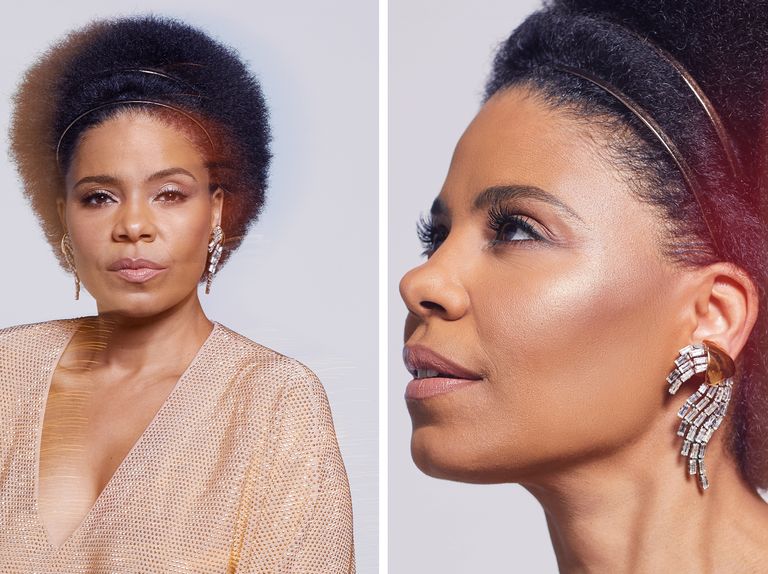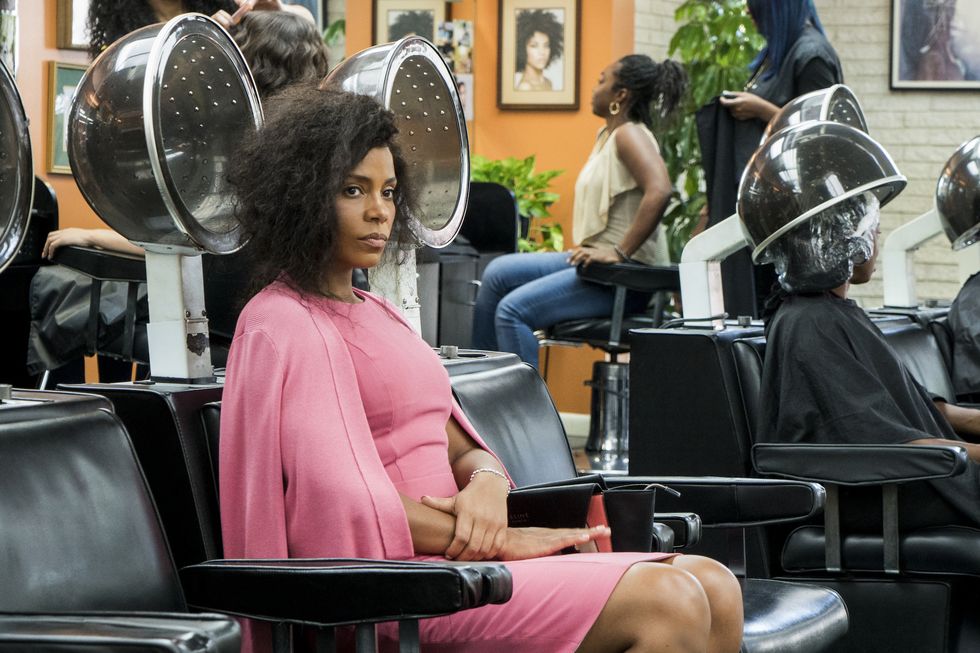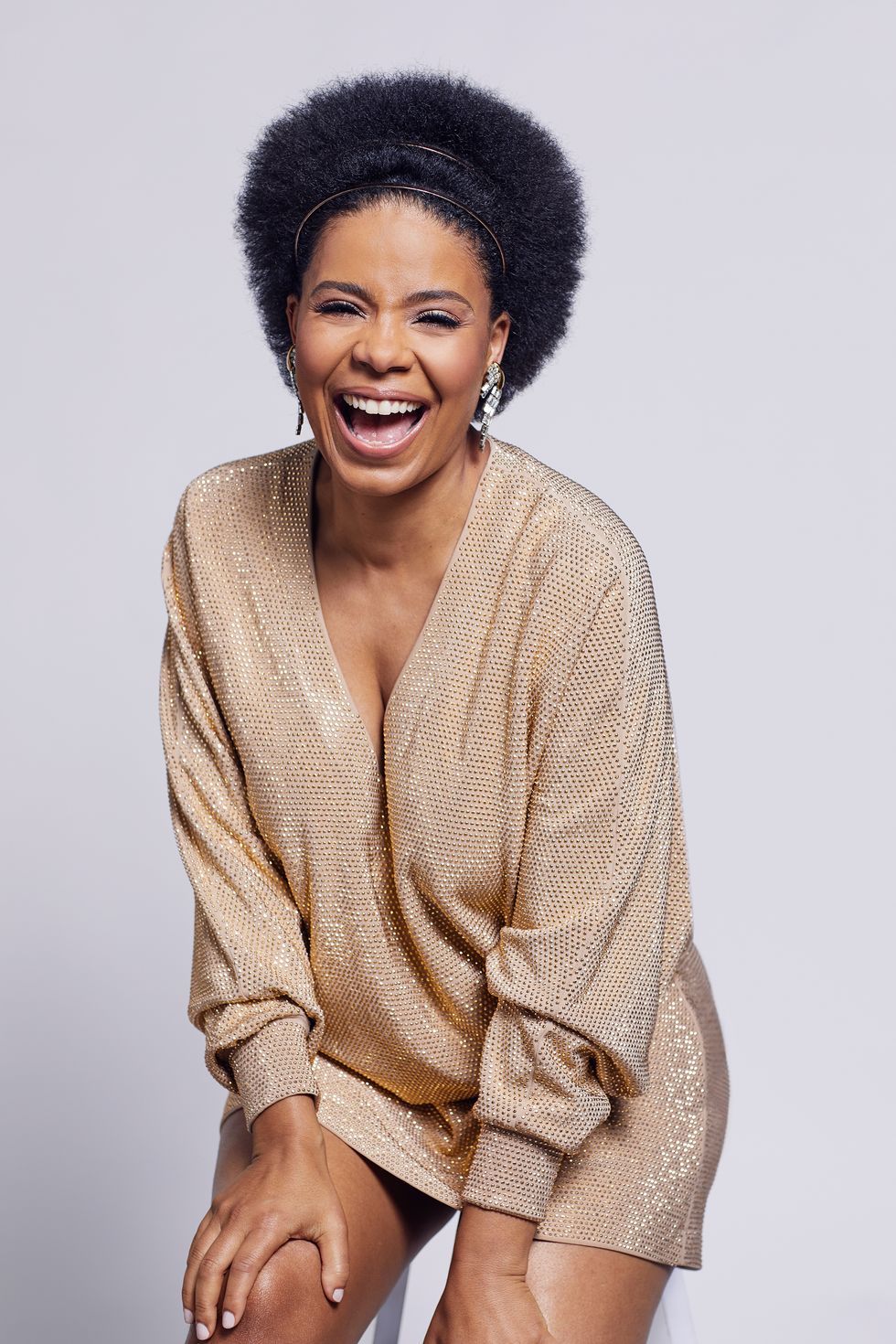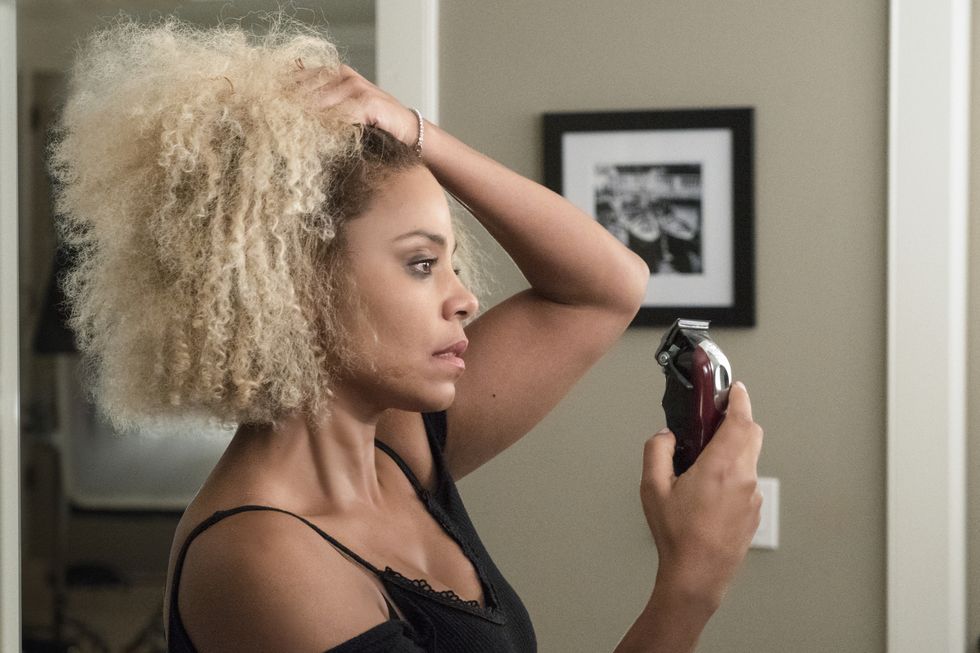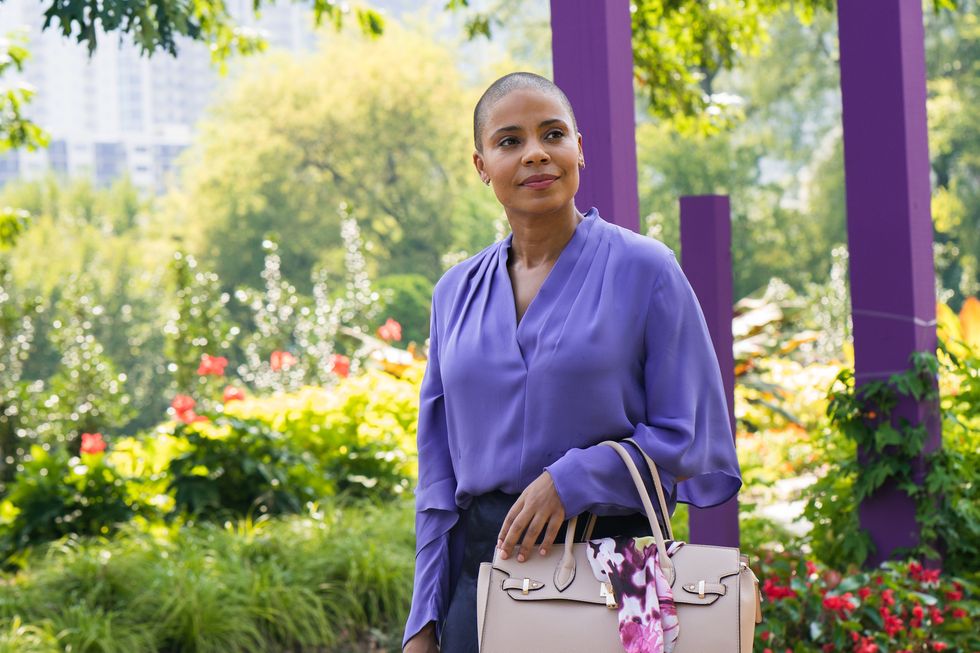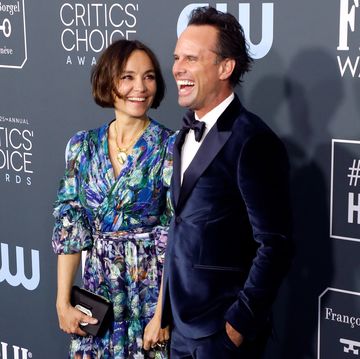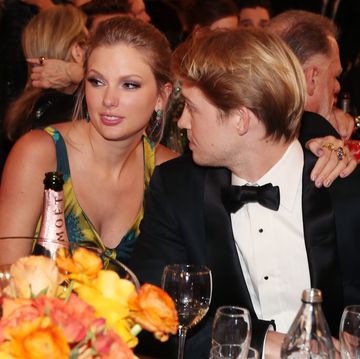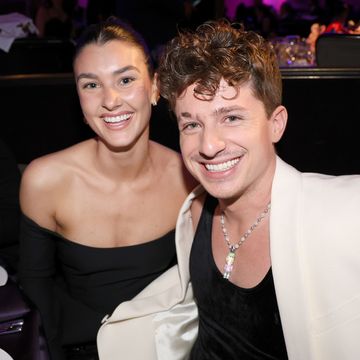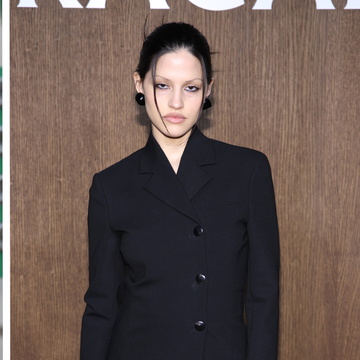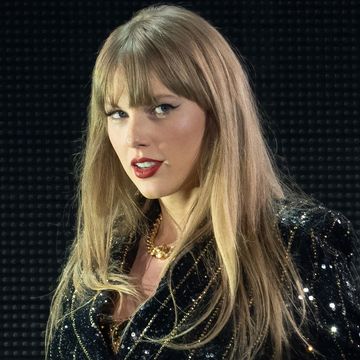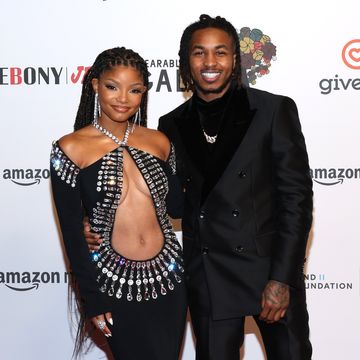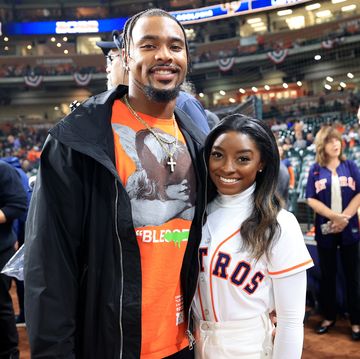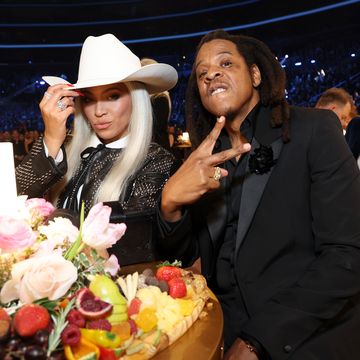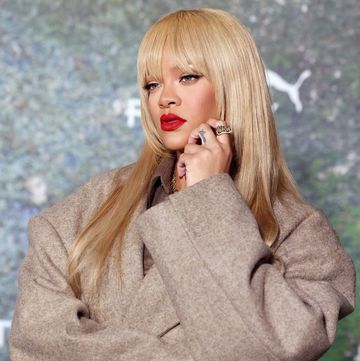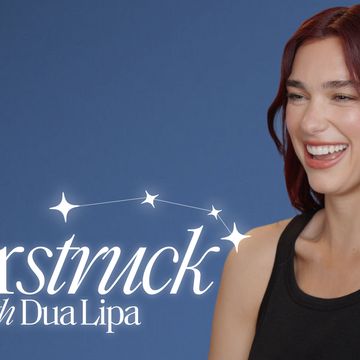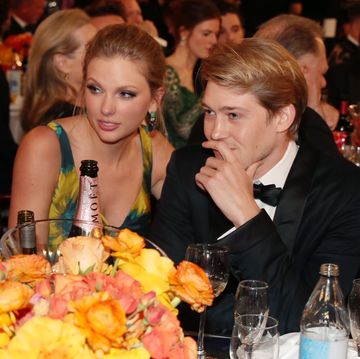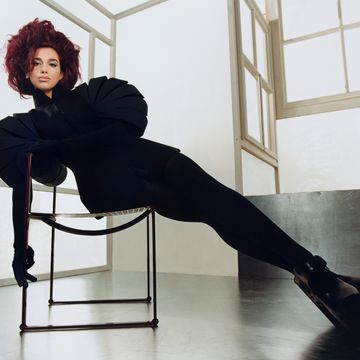It occurs to me, a bit too late, that I may have gotten too comfortable around Sanaa Lathan. We’re sitting on a sofa in the lobby of her hotel, snacking on crab toast, and chatting. Well, she's sitting. Leaning forward attentively in fashionable blue-grey sweats and black flip flops, alternating between eating and answering my questions. Me, I'm sprawled out, maxing and relaxing, not a care in the world, like we've ordered too much pad thai take out and we're about to dive into our third Rick Famuyiwa movie on the couch at home. Lathan checks—and not for the first time—to make sure my phone recorder is catching her answers over the French pop music doodle-doo-ing out of the hotel speaker system. Right. Good call. I straighten up and move the phone closer.
It feels very natural to talk to Lathan. Her presence is energizing and engaging; like that friend you sort of know and are compelled to impress. As much as I'm here for her loquaciousness, her candor, and her jokes, I'm still smarting from the slightly less than impressive way our time together kicked off. We were originally scheduled to have lunch, but when her photoshoot ran over, which they inevitable always do, a certain trendy eatery wouldn't hold our reservation. Lathan seemed not to mind and quickly suggested we settle for the lounge area back at her hotel. She didn't bat a lash. Me, I got shirty about it. Perhaps the restaurant management did not remember the electric intensity of Lathan's work in Love & Basketball? Did I need to show them a YouTube clip of the climactic game of strip one-on-one she plays against Omar Epps? Did I need to call up the Better Business Bureau? Perhaps the Best Man Business Bureau. This was an outrage. But Lathan wasn't pressed. She's quick to pivot, find a solution, and get back to the work at hand.
Lathan's new Netflix film Nappily Ever After is a career milestone—only her second producer credit (the first being 2015's The Perfect Guy), though she notes she's done the same developmental work on other projects without the title. She's been toiling behind the scenes to guide the work she's putting into the world, she says, but the recognition is new. "I've been in the business for 20 years," she reminds me. "Half the time I know more than a lot of the people on set." The official title crystalizes the mission Lathan says has defined her career. "I love telling black female stories, women's stories. I'm proud of that."
In the new film, Lathan plays Violet Jones, a successful ad exec whose carefully curated life—from her perfect boyfriend (Rick Whittle) to her precision straightened hair—suddenly falls apart, catapulting her on a journey of self-discovery. At first glance, it seems to be in the vein of Brown Sugar or Something New, romcoms in which Lathan played funny, relatable heroines who found love despite obstacles. But, she's quick to point out, there's another agenda at play in Nappily Ever After. "It's a love story about falling in love with yourself," she says. "It's about finding out who you are, who you really are, outside of what your parents tell you, what society tells you, what the conditioning of centuries of marketing and movies and television and fashion magazines tells you. Outside of all of those things that condition us, who are you really? What do you want? Who do want to be?"
The project has brought the professional life of Sanaa Lathan and the personal journey of Sanaa Lathan closer than ever before, new territory for an actress who makes a point of being all about the work. ("I'm really just an actress who really loves to tell stories," she says with a shrug.) Based on the hit book of the same name by Trisha R. Thomas, Nappily Ever After follows Violet through a series of personal revelations and the hair journey that mirrors them. She's processed, hot-combed and uptight to start, then a beauty shop mishap forces her to seek the help of a weave, finally at her nadir, she goes blonde, gets caught in the rain, and then shaves it all off in a cathartic, emotional scene. And yes, that is her hair that we see Lathan taking a pair of clippers to in a scene that was filmed early in the process. "Because I helped develop the script, at first I was like, 'Oh, I'll just get a really expensive prosthetic,'" she says. "And then, the more I started working on the character, the more I thought, 'I have to really do it.' Because if I didn't do it as the actress, it's in a way undercutting the message of the movie."
Once shorn, Lathan's social media accounts lit up with photos of her shaved head in all its gloriousness. "There was a little bit of art imitating life, life imitating art in that I was just kind of over it with my hair," she says. "After being in the business for 20 years, always having to worry about wigs and weaves. A lot of times you're doing it for characters. You're also doing it for protective styles, because you can't be on set every day getting heat put on. Our hair will fall out." Eventually, she says, she just got tired of doing her hair all-together. "I would just put a baseball cap on. Somewhere in me, I was ready. But, of course, [shaving your head] is terrifying—I've been conditioned like the rest of us."
Women, particularly black women, she says, are taught that hair is beauty, hair is an indicator of desirability, and it's crucial to society's acceptance. For centuries, black women have navigated another overlaid set of messages that tell them their natural hair can never be beautiful, that they must go through complicated and sometimes painful processes to achieve desirability, if it comes at all. For Lathan, the realization that her character comes to mirrored her own—at once a breaking point and a moment of liberation. "You know that scene in Black Panther where [Okoye's] like, 'Ugh, I hate this shit'?" she tells me, describing a fight scene in which Danai Gurira's character rips off a wig she's wearing and puts it to use as a weapon. "That's how I was feeling. I was feeling hot, and it itches, and it's a hat. And I was just physically over it... We're not saying, 'Natural is the only way.' We're just saying, ‘It's just as beautiful.’ So if you want to wear wig, and you want to get your hair straightened, or wear a weave, there's nothing wrong with that. But there's also nothing wrong with your natural self."
Months after the filming, her hair has grown into a medium-length crown. She thinks she'll keep it. And, to her surprise, the industry is here for it, too. She's coming off of her first season on the Showtime drama The Affair and relays a story about going in for the camera test for the character, charter school principal Janelle Wilson. "I brought a wig, like a beautiful, long, silky wig. My hair was newly really short. It wasn't bald, but it was the lowest it could be. And I knew in my mind, 'You know, this character could be either of these women. But, the bolder choice is my own hair.' I just needed a little bit of reassurance." The unanimous choice on set was her own hair. "I was so shocked," she says.
Somewhere on the path to Nappily Every After, something new clicked into place for 47-year-old Lathan. "My character in the movie says, 'I wonder who I'll be.' I kind of feel like I'm going through that," she tells me. I ask if this shift in perspective has been gradual or a sudden awakening. She thinks for a second and takes a bite of food. It's too hot and she cracks up. After a moment, she's back. "Culturally they tell you that once you get to a certain age, you can't do certain things. There are all these labels. So, you have to define, once again, who you want to be. Am I going to succumb to them telling me that all of the sudden my life is entering its lesser half? No. That's bullshit."
When we entered the hotel lobby, she in sunglasses and toting a garment bag full of clothing from the morning photo shoot, I watched heads swivel in her direction with whatever the thing just shy of discretion is. Though she is accessible and relaxed in person and chameleonic on screen, she is also, in passing, instantly recognizable. She has a face that you know you know—across genres, styles, and demographics. Roles in love stories like 2000's Love & Basketball put her in the date night heroine pantheon somewhere between the early-aughts Sandra Bullock and Reese Witherspoon, especially with black audiences. But her resume deftly pivots, defying easy categorization. She's mysterious and haunted in the thriller Out of Time, she's tough and action-oriented in Alien vs. Predator; she's a long-time voice actor in Family Guy. The list zigs and zags on. "There was a period where I was doing a lot of romantic comedies," she notes, "But then I've done American Assassin and Now You See Me 2 and Blade. If you see the theater work,"—she earned a Tony nomination for the 2004 Broadway production of A Raisin in the Sun—"you realize that there is no lane."
Like so many good actors, Lathan has a prismatic presence, capable of being many things at once. But she doesn't intend for "celebrity" to be one of those things. "It's rarer than you think in this industry," says Gina Prince-Bythewood, Lathan's director on Love & Basketball, Disappearing Acts and the 2017 Fox series Shots Fired. "People who are so dedicated to being a great actress and less the celebrity, and Sanaa absolutely embodies that. She just wants to do good work. She just wants to find great parts."
In addition to returning to for a second season on Showtime's The Affair, Lathan is also working on developing the Lynn Nottage play, By the Way, Meet Vera Stark, as a film project for herself. She played the titular role in the play’s 2011 off-Broadway premiere, portraying Vera, a young, hopeful black actress confronting prejudice in 1930s Hollywood and later, a tough, thorny older version in the 1970s. As an actress, she sits between the two life stages where we meet Vera and though she’s had far more opportunity than the character did, she still recognizes the journey. And the effort it takes. "This is another story that hasn't been told, about how for so many years all these amazing, talented black women could only play maids." She leans forward, her eyes flash. "Can you imagine? My whole career: only able to play maids."
Maybe it's this knowledge of what could be—and, in some ways, what still can be, and often is, inside an industry that likes to box and package stars—that fuels Lathan's determination to show new sides of herself. Prince-Bythewood, for one, knows we have much more to see from Lathan. "Sanaa is absolutely poised and primed to just have that great role that just makes the world see what so many of us have seen throughout the years," she says. "A lot of us want to tell stories that focus on and provide more opportunity for black actors and actresses who don't always get to tell their stories."
Women of color in film and TV today are still diligently pushing for more opportunities, creating a bigger pool of roles than Sanaa Lathan could have gone out for when she first started her career, if only they were available. And creators like Prince-Bythewood, Lathan's friend and frequent collaborator, have been instrumental in creating and holding those spaces. "When I was coming up, you could literally count the black actresses working and I knew all of them," says Lathan. "Now I can't count them and I don't know them all. That's a great thing." She's also quick to point out the work of black actresses who came before her, like Alfre Woodard, with whom she's worked three times, and Phylicia Rashad, with whom she's worked twice. She says, "I feel so blessed to have been able to work with both of them. Not only just from watching people who are masters at their craft, but just seeing the grace with which they handle being in the business and having long careers in the business."
It's a complex, and not entirely just, system, she says, that requires a lot of any performer, and even more from a black woman. "They say you have to have an armor of steel, but you have to keep your heart soft and vulnerable and sensitive, otherwise you won't be able to do the work." It's a dichotomy that's made even harder by the changes in how celebrities interact with the public, something that has evolved for her over the years. To wit: while people have long recognized her when she was out and about, she's noticed an uptick in recent years, something she attributes to her films being replayed on cable. "The only reason why I know this is because of Twitter. Literally every time something is on, you see [people start to tweet]."
For this self-described private person, this ever-expanding celebrity social media ecosystem is conflicting. Yes, it's great to have your work reach new audiences, but it comes with more public scrutiny. And sometimes that scrutiny becomes bigger and louder and more consuming. It's something the actress brushed up against early this year in a perfect storm of celebrity gossip involving a magnetic comedian who tells great stories, the biggest pop star in the world, and a mastication confrontation in a dancery. Lathan has denied having anything to do with the events in question—thrice!—and doesn’t feel the need to do so again when I ask. But social media and modern celebrity have different hungers. It can be frustrating, she admits.
"If you're in the public eye, you're always going to be the subject of rumors, and people will talk about you. I used to have horrible rumors circulate about me back in the day from the radio, and from blogs, but before social media was right at your fingertips." I admit, I expected her to be either more defensive about the whole thing, but she's sanguine; it's just part of the job. She tells me that when she filmed Disappearing Acts, a 2000 HBO film with Wesley Snipes, she gained weight and wore a prosthetic stomach and someone on the radio reported that she was pregnant by another actor. "It was interesting because people really believe what they hear, whether it's on the radio or if it's in print. My mother had to argue with people, to say, 'No, no, no, she's not pregnant. That's my daughter.' 'Well, she didn't tell you, girl. She didn't tell you.'"
But, she notes, when she debuted her close-cropped hair on The Affair last season, Twitter lit up with compliments on her "TWA"—or "Teeny Weeny Afro." And look at how much that TWA has galvanized her now.
Perhaps Lathan's resigned ease with the push-pull of celebrity access is natural-born: Lathan's mother, Eleanor McCoy, was an actress in the 1970s and 1980s; her father Stan Lathan, is a director. Still, she says, she's only interested in playing the game but so much. You won't see her calling the paparazzi to catch her on a Starbucks run or dropping her own name to a gossip columnist. "What does it have to do with me being an actor?" she asks, and doesn't wait for an answer.
Sanaa Lathan wants you to contextualize her by her work and her work alone. She was not in the aughts, and is still not, the black Sandra Bullock. Nor is she any of her contemporaries and frequent co-stars, like Regina Hall or Gabrielle Union. "I'm Sanaa," she says, more than once. A complete sentence. In an industry that still struggles to get representation right and to understand that the right actress can play any role, this is important to her. "I just want to be stretching outside of my comfort zone," she says. "Do things that scare me, play roles that are a stretch for me, working with better and better directors and better scripts. I'm simple that way." It always comes back to the work.
Still, you have to see Sanaa Lathan do a photoshoot. When I entered the studio earlier in the day, she was already situated in a chair in front of a lit vanity, being fussed over by a trio of artists. Hair stylist Larry Sims, who also did the wigs for Nappily Ever After, put the finishing touches on her luminous afro. Stylist Chloe Flower popped on two Yves Saint Laurent earrings with diamonds arranged in a swoosh that calls to mind Hermes' winged shoes. Behind her, a shimmering gold Balmain mini-dress glinted alluringly. Lathan, still in sweats and chatting on FaceTime, looked like a goddess, and I practically duck into the photo studio to make sure they have an altar on hand.
She slipped into the Balmain and sashayed playfully across the floor, moving the gold fabric like wind across the surface of the water. She was feeling herself. She caught one last glimpse in the mirror and exclaimed, "I love my 'fro!"
She evinced the same exuberant triumph that her character in Nappily Ever After eventually experiences. For both the woman on screen and the woman in real life, it has been a hard-won victory. "For many, many years, there was a lot of shame with our natural coarse, kinky hair," she tells me later. "We never were told that it was beautiful in our culture's stories. It wasn't reflected in the fashion magazines." But she hopes we’re in a renaissance moment. And she hopes her film will also add to a growing chorus, a new narrative.
Later, in the studio, clad in gold, Sanaa positioned herself on a stool, drew a hand up to her face, and shot the photographer a fearsome look. She was giving '70s soul, she was giving Black Is Beautiful, she was giving Diana Ross glamour. It was stunning. I was stunned.
As it turned out, I was probably enjoying it more than she was. I don't think she'll mind me relaying that she later told me she’d been nervous about the shoot. Taking pictures is a different skill, she says. "It's really all about yourself, whereas acting is all about the other person." She's learned how to do it but there's always a little angst. This gets to the heart of who Sanaa Lathan—the artist, the worker; head in a script or finding its light, nose never far from the grindstone—appears to be at this moment. She's focused on the work, sure. She's focused on her impact in the world, absolutely. But now she's learning to focus on what feels natural too. Observing the way she owns the lens, the ego-less way she commands the space, I'd say this, too, comes more naturally than she gives herself credit. Or maybe I'm just watching her put in the work.
